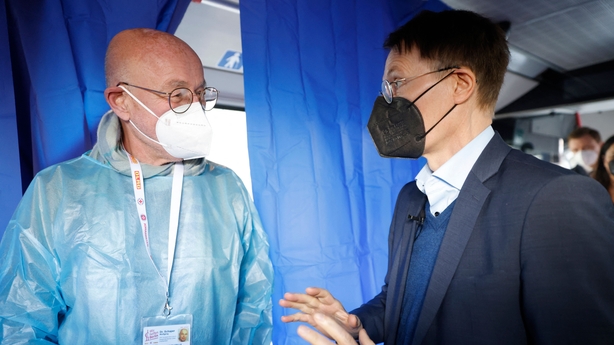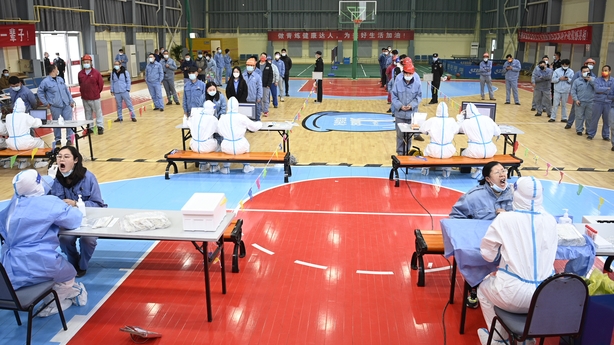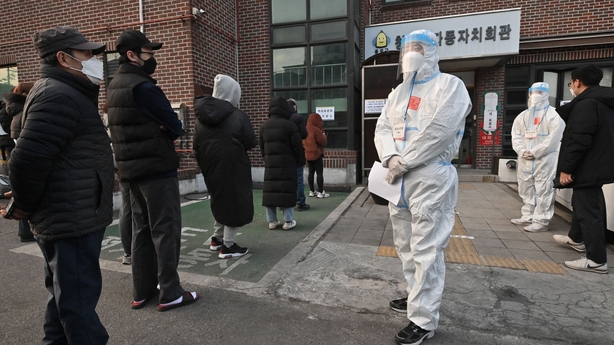Covid-19 infections have risen in the UK, with levels in Scotland at a record high, new figures show.
It is the first time since the end of January that England, Scotland, Wales and Northern Ireland have seen a simultaneous week-on-week increase in infections, and is the clearest indication yet that the virus is once again becoming more prevalent throughout the UK.
Around one in 25 people in private households in England had Covid-19 in the week to 5 March, or 2.1 million people, according to the Office for National Statistics (ONS).
This is up from one in 30, or 1.9 million people, in the previous week, and comes after three successive weeks where infections in England were estimated to have fallen.
By contrast Scotland has now seen infection levels rise for six weeks in a row, with 299,900 people likely to have had coronavirus last week, the equivalent of one in 18.
This is the highest figure for Scotland since estimates began in autumn 2020, according to analysis by the PA news agency.
The previous record was 297,400 people in the first week of this year.
Wales and Northern Ireland both saw a jump in prevalence last week following a period of falling infections, with the estimate for Wales up from 94,200 people to 97,900, one in 30, and Northern Ireland up from 106,300 people to 143,800, one in 13.
Across the UK as a whole, 2.6 million people were estimated to have coronavirus last week, up from 2.4 million.
The number stood at 4.3 million at the start of the year.
The ONS infection survey is the most reliable measure of the prevalence of coronavirus in the UK, and its latest findings provide the clearest indication so far that the broad downwards trend in infections since January has come to a halt.
Estimates for the next few weeks will confirm whether a new upward trend in infections is now under way.
The ONS survey uses a representative sample of swab tests collected regularly from tens of thousands of households, and is therefore able to estimate the percentage of people likely to test positive for Covid-19 at any one point in time, regardless of when they caught the virus, how many times they have had it and whether they have symptoms.
The survey is far more reflective of the level of Covid-19 in the UK than the number of cases announced each day by the Government, which includes only those people who have reported themselves as testing positive for the virus, and is being increasingly affected by how many people are coming forward for tests or who are taking a test because they know they have coronavirus symptoms.
Today's ONS figures come after separate data this week suggested the slow fall since early January in the number of patients in hospital in the UK with Covid-19 has stopped, with the total rising in recent days.
Patient numbers remain well below the levels seen at the peak of the first and second wave of the virus, however.
The hospital admission rate in England for patients with Covid-19 stood at 11.3 per 100,000 people in the seven days to 6 March, up from 9.8, the first week-on-week rise since the start of the year, according to the Health Security Agency.
Admissions rates have increased among all age groups, but are highest among over-85s, at 118.8 per 100,000 people, up week-on-week from 88.8.
Germany in new Covid 'critical' situation: health minister
Germany is sliding into a new "critical" health situation with coronavirus cases soaring to new records, its health minister has warned, as he pleaded with vaccine holdouts to get vaccinated.
"I often read that the Omicron variant is less virulent. That's only partially true," said Karl Lauterbach at a press conference, stressing that 249 people died from the disease yesterday alone.
"Germany is in a critical situation," he said, warning that intensive care services could get overwhelmed and cases of so-called long Covid could grow.
Mr Lauterbach said the public and political mood was deceptive - that "we have mastered the pandemic."

But "we cannot be satisfied with a situation where 200 to 250 people are dying a day," a toll that could worsen in the coming weeks, he argued.
Germany is planning to further ease Covid curbs from 20 March, including ditching the requirement for employees to work from home whenever possible.
But it reported more than a quarter of a million new infections today.
Lothar Wieler, who heads the disease control agency Robert Koch Institute, said the situation was worsening because of the more transmissible sub-variant BA.2, which now comprises more than a third of new cases in Germany.
"Without mandatory vaccinations, we will not be able to overcome the pandemic in the autumn," Mr Lauterbach warned.
Chancellor Olaf Scholz has called for vaccinations to be made mandatory, but plans to pass the bill in parliament have been delayed.
The initiative however remains controversial with even some members of the parties making up his three-way coalition opposed.
Austria, which had led the way on obligatory jabs, has also this week suspended the rule.
Around three in four people in Germany are fully vaccinated, and 57% have received a third dose.
But 19.6 million people - including four million aged four years and younger - remain unvaccinated.
Chinese city of 9 million locks down amid Covid surge
A northeastern Chinese city of nine million people was ordered to lock down, as authorities scramble to halt a fresh Covid-19 outbreak that has pushed nationwide case counts to their highest in two years.
Changchun, the capital of Jilin province and an important industrial base, has ordered residents to work from home.
One person will be allowed out every two days to buy "daily necessities", and said it would institute mass testing.

After the highly transmissible Omicron variant broke through China's defences, Covid cases across the country soared past the 1,000 mark this week for the first time since the pandemic's early days in 2020, from less than 100 just three weeks ago.
There were 1,369 cases across more than a dozen provinces, according to the latest daily official count released earlier today.
Shanghai has ordered its schools to close and shift to online instruction.
Covid-19 was first detected in China in late 2019 and the government has pursued a policy of snap lockdowns and mass testing, while keeping its borders mostly closed.
The aggressive approach has caused pandemic fatigue in China.

The country's central economic planning agency recently warned that big lockdowns can hurt the economy, and a top Chinese scientist suggested the country should aim to co-exist with the virus, like other nations.
The government has invested much of its prestige in its ability to control Covid, however, and today's measures appeared to pour water on hopes that China would soon scrap its zero-tolerance approach.
Covid-linked deaths in Asia pass 1 million
Asia passed the grim milestone of 1 million coronavirus-linked deaths, a Reuters tally showed, as a spike in Omicron variant infections spreads across the region after starting in nations such as Japan and South Korea.
The death toll in Asia, home to more than half the world's population, reached 1,000,045, contributing 16% of global deaths related to Covid-19, the tally showed.
New cases remain at record or near-record levels in Malaysia, Singapore, South Korea, Thailand and Vietnam, but have fallen sharply from their peaks in India, Indonesia and the Philippines.
Deaths have soared to records in the East Asian countries of Japan and South Korea and the financial hub of Hong Kong.
Covid-19 deaths in Hong Kong have risen to an average of more than 200 a day in the last week, up from one or two earlier, as the outbreak tears through hundreds of nursing homes, hitting many of the city's unvaccinated elderly.
South Korea's daily average is 186 deaths, three times the level of its 2021 surge.

Bucking the trend, the world's second-most populous nation of India, which accounts for almost 52% of Asia's total Covid-19 deaths, reported a sharp fall in both infections and deaths over the past month.
India reported fewer than 5,000 cases and 200 deaths a day during the last four days versus its peak this year in January of more than 300,000 cases and 1,000 deaths each day, official figures show.
China, Singapore and South Korea have vaccinated more than 85% of their populations with two doses, but less than 40% of the population in Myanmar, Uzbekistan and Kyrgyzstan is fully vaccinated, a Reuters analysis of Our World in Data showed.
In the wider Asian region, roughly 65% of the population have received two vaccine doses.
Hong Kong, weighing mass testing for its 7.4 million people, has ordered its toughest curbs with bans on public gatherings of more than two people, the closure of most venues, and a halt to flights from nations such as Britain and the United States.

